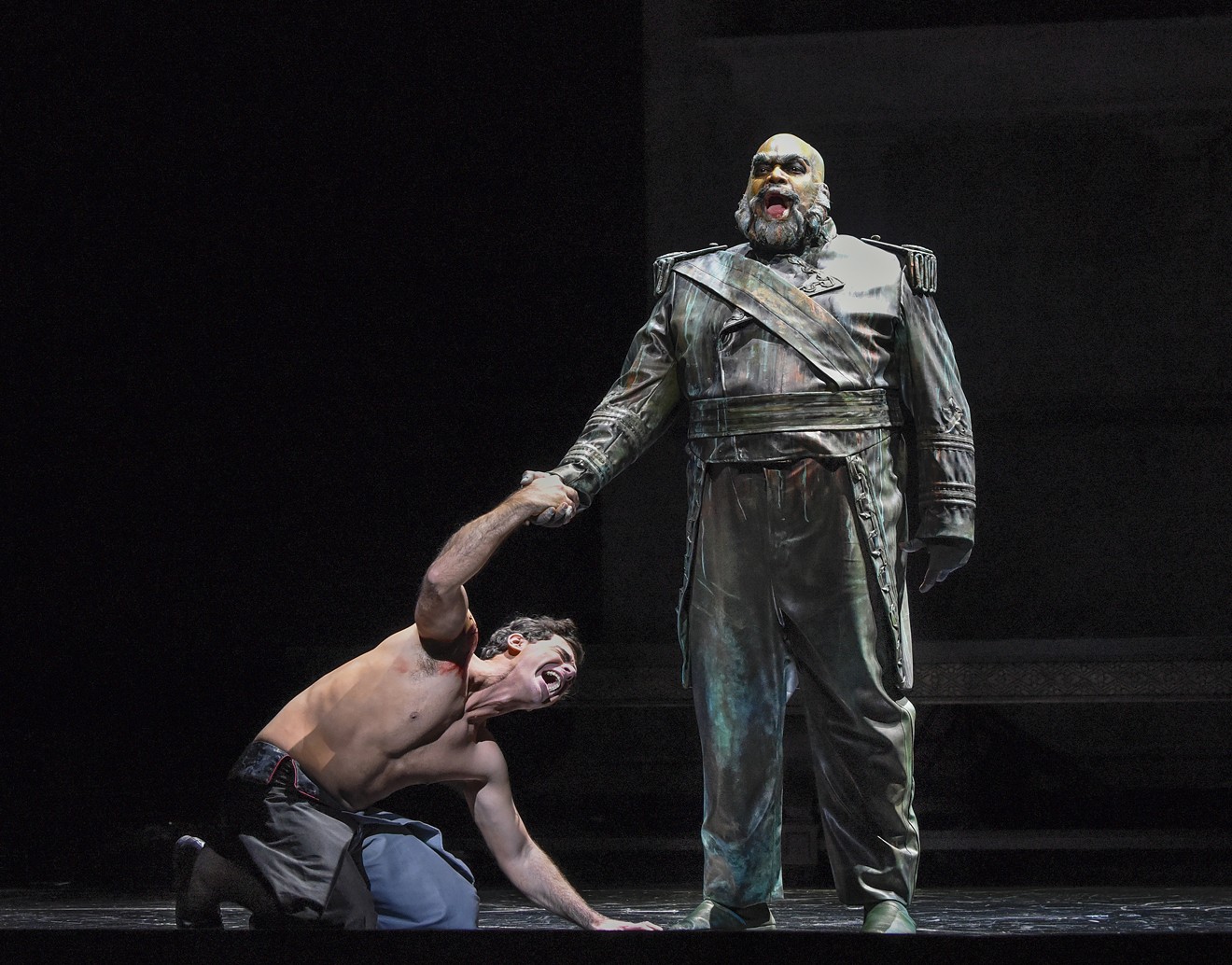But every sexual encounter devolves to at least coercion and at worst physical force. His methods are beyond predatory; he gets women drunk and chains victims, beginning with Donna Anna in the first scene. In the final scene, a woman is seen bound and gagged on the floor of Giovanni's villa just before he is condemned to hell.
Mozart’s opera was first performed in Prague in 1797; the update to the 1920s broadens the discussion. In this #MeToo moment, the production ends with an ensemble of six singers pointing at the audience as the house lights come up. They're singing the unambiguous refrain, "All sinners receive their just reward."
For its final show of the 2017-18 season, the Dallas Opera presents Lyric Opera of Chicago’s two-act Italian opera about the womanizing title character and his fate. Don Giovanni is part comedy and part drama with an element of the supernatural. But at its heart, it is a morality story. In the end, smoke engulfs Giovanni as he descends into hell.
Illness forced a last-minute cast change at Friday night’s opening. Baritone Craig Verm filled in for the highly anticipated Mariusz Kwiecien in the role of Don Giovanni. Verm’s velvety voice and suave manner brought believability to his attempts to seduce women with compliments and promises of marriage, but he was less convincing as the degenerate Giovanni.
Bass-baritone Kyle Ketelsen made his Dallas Opera debut as Giovanni’s put-upon servant Leporello, who is forced to keep records of his lecherous master’s conquests. Ketelsen played the role exceedingly well; his use of gestures and facial expressions and his knack for physical comedy brought a great deal of humor to the dark duties he performed for his increasingly evil employer. His singing matched his comic acting and kept the audience laughing to the end, when he sings that he is "off to the bar to find a better boss."
Soprano Laura Claycomb as Donna Anna gave a multidimensional performance. Her crystal-clear tone brought pathos to her role in quiet moments, and her passionate acting demonstrated determination as the avenger of her father’s murderer, Don Giovanni. Her poignant portrayal added interest to the character of Donna Anna."All sinners receive their just reward." — ensemble, Don Giovanni
tweet this
The role of Donna Elvira, sung by soprano Katie Van Kooten, was a highlight of the evening. Kooten portrayed Elvira’s ferocity and vulnerability equally well, kicking and punching Giovanni then nearly falling for him again. Kooten is also extremely funny and good at physical humor without overdoing it. Her stage presence and strong, full voice made her a fantastic embodiment of Donna Elvira.
The lithe tenor David Portillo as Don Ottavio shone, and his voice never wobbled as he sustained and stretched notes to impressive length. His forthright commitment to his fiancé, Donna Anna, served as a welcome counterpoint of manhood to Giovanni.
Bass Morris Robinson dominated the stage as the Commendatore who confronts Giovanni with his sin and then sends him to hell. In the first act, his booming bass sounded a bit muddy, but any problems were overcome, and his condemnation of Giovanni was loud and clear.
Mezzo-soprano Virginie Verrez as Zerlina and bass-baritone André Courville as Masetto gave solid performances. Their passionate duet, in spite of its horrifying admonition that Masetto should beat Zerlina for her dalliance with Giovanni, was especially well sung.
Walt Spangler designed impressive sets aided by the masterful lighting of Christopher Maravich. All were beautiful: Don Giovanni’s spectacular villa with huge stairways covered in masses of greenery, a graveyard filled with flowers amid large crosses and a banquet table that overflowed with an opulent feast beneath nine gigantic gas-lit cylinders suspended from the ceiling.
This production moved the action to Spain in the 1920s, but many times, the costumes did not clearly indicate any particular time. Sometimes it seemed that costume designer Ana Kuzmanic had raided the costume closet. A motorcycle and sidecar deliver Donna Elvira wearing a leather jacket, and in the next scene, wedding guests arrive in a wooden cart dressed in ambiguous peasant garb. During the masquerade scene, masked guests appeared in Victorian ruff collars, a toreador outfit and hoop skirts.
The virtuosic Dallas Opera Orchestra, with impeccable conducting by Music Director Emmanuel Villaume, was enhanced by the addition of the gentle stringing of a harpsichord.











